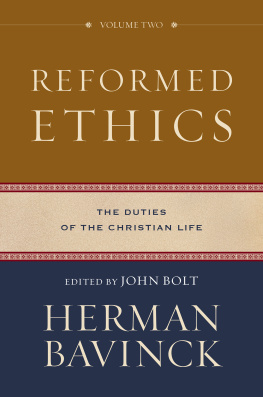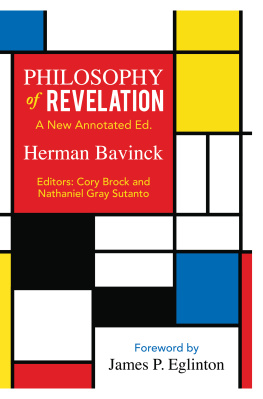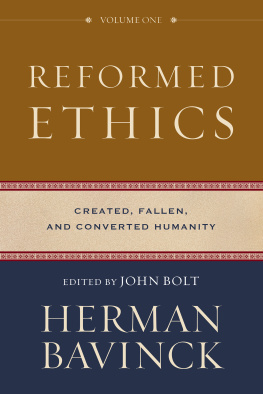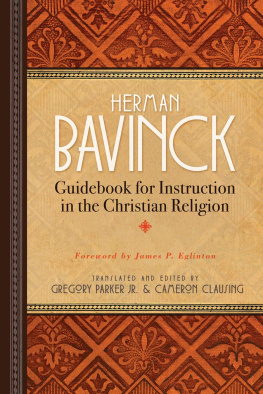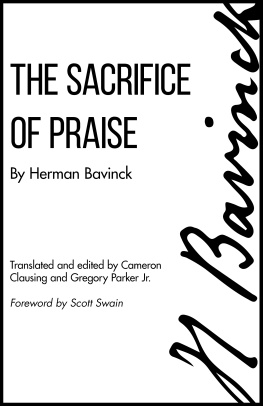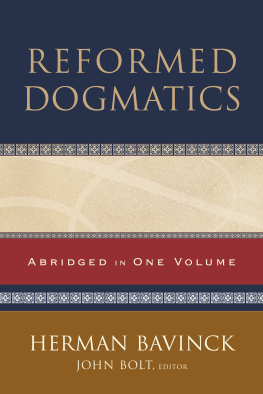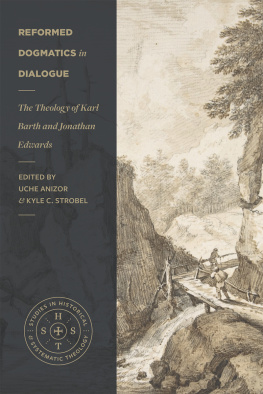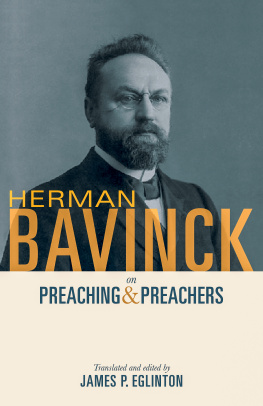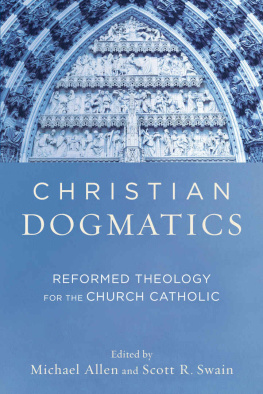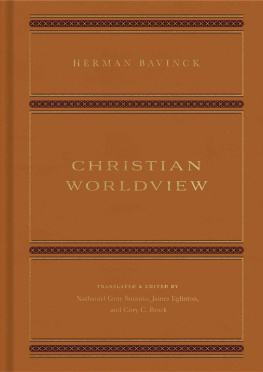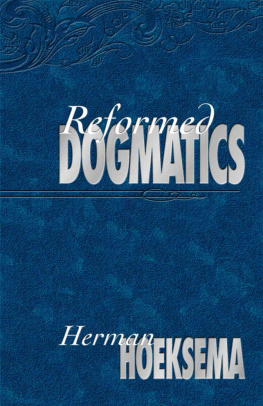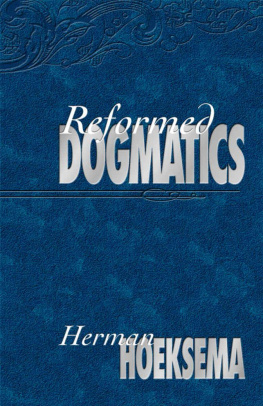Herman Bavinck - Reformed Ethics--Volume 2: The Duties of the Christian Life
Here you can read online Herman Bavinck - Reformed Ethics--Volume 2: The Duties of the Christian Life full text of the book (entire story) in english for free. Download pdf and epub, get meaning, cover and reviews about this ebook. year: 2021, publisher: Baker Publishing Group, genre: Religion. Description of the work, (preface) as well as reviews are available. Best literature library LitArk.com created for fans of good reading and offers a wide selection of genres:
Romance novel
Science fiction
Adventure
Detective
Science
History
Home and family
Prose
Art
Politics
Computer
Non-fiction
Religion
Business
Children
Humor
Choose a favorite category and find really read worthwhile books. Enjoy immersion in the world of imagination, feel the emotions of the characters or learn something new for yourself, make an fascinating discovery.
- Book:Reformed Ethics--Volume 2: The Duties of the Christian Life
- Author:
- Publisher:Baker Publishing Group
- Genre:
- Year:2021
- Rating:5 / 5
- Favourites:Add to favourites
- Your mark:
- 100
- 1
- 2
- 3
- 4
- 5
Reformed Ethics--Volume 2: The Duties of the Christian Life: summary, description and annotation
We offer to read an annotation, description, summary or preface (depends on what the author of the book "Reformed Ethics--Volume 2: The Duties of the Christian Life" wrote himself). If you haven't found the necessary information about the book — write in the comments, we will try to find it.
Reformed Ethics--Volume 2: The Duties of the Christian Life — read online for free the complete book (whole text) full work
Below is the text of the book, divided by pages. System saving the place of the last page read, allows you to conveniently read the book "Reformed Ethics--Volume 2: The Duties of the Christian Life" online for free, without having to search again every time where you left off. Put a bookmark, and you can go to the page where you finished reading at any time.
Font size:
Interval:
Bookmark:
2021 by John Bolt
Published by Baker Academic
a division of Baker Publishing Group
PO Box 6287, Grand Rapids, MI 49516-6287
www.bakeracademic.com
Ebook edition created 2021
All rights reserved. No part of this publication may be reproduced, stored in a retrieval system, or transmitted in any form or by any meansfor example, electronic, photocopy, recordingwithout the prior written permission of the publisher. The only exception is brief quotations in printed reviews.
Library of Congress Cataloging-in-Publication Data is on file at the Library of Congress, Washington, DC.
ISBN 978-1-4934-3209-7
Unless indicated otherwise, Scripture quotations are from the ESV Bible (The Holy Bible, English Standard Version), copyright 2001 by Crossway, a publishing ministry of Good News Publishers. Used by permission. All rights reserved. ESV Text Edition: 2011
Scripture quotations labeled CEB are from the Common English Bible. Copyright 2011 by the Common English Bible. All rights reserved. Used by permission.
Scripture quotations labeled KJV are from the King James Version of the Bible.
Scripture quotations labeled NIV are from the Holy Bible, New International Version. NIV. Copyright 1973, 1978, 1984, 2011 by Biblica, Inc. Used by permission of Zondervan. All rights reserved worldwide. www.zondervan.com
Scripture quotations labeled NRSV are from the New Revised Standard Version of the Bible, copyright 1989 National Council of the Churches of Christ in the United States of America. Used by permission. All rights reserved.
Quotations of the Heidelberg Catechism, the Belgic Confession, and the Canons of Dort are from the translations produced by the joint task force of the Reformed Church in America and the Christian Reformed Church in North America and available at https://www.crcna.org/welcome/beliefs/confessions.
Baker Publishing Group publications use paper produced from sustainable forestry practices and post-consumer waste whenever possible.
To Richard John Mouw
For keeping Christ and the law together
Half Title Page
Title Page
Copyright Page
Dedication
Editors Preface
Abbreviations
Book III Humanity after Conversion
13. Duties, Precepts and Counsels, Adiaphora
27 The Doctrine (Theory) of Duty
28 Precepts and Counsels
29 Duties and the Permissible; Adiaphora
14. Collision and Classification of Duties
30 Collision of Duties
31 Classification of Duties
Part A Our Duties toward God
15. No Other Gods; No Images
32 The First Commandment
33 The Second Commandment
16. The Honor of Gods Name
34 The Third Commandment
17. The Sabbath
35 The Fourth Commandment
Part B Our Duties toward Ourselves
18. General Bodily Duties to Self
36 General Duties (Self-Preservation)
37 Duties toward Bodily Life
38 Food and Nourishment
39 Clothing
20. Bodily Duties to Our Souls
40 Our Duty to Life Itself
41 Attending to Bodily Life in the Seventh through Ninth Commandments
42 Duties toward the Soul
Part C Duties toward Our Neighbor
21. Loving Our Neighbor
43 Neighbor Love in General
44 Degrees of Neighbor Love (Fifth Commandment)
45 Concern for Our Neighbors Life (Sixth Commandment)
46 Duties toward Our Neighbors Chastity (Seventh Commandment)
47 Duties toward Our Neighbors Property (Eighth Commandment)
48 Duties toward Our Neighbors Reputation (Ninth Commandment)
49 Covetousness (Tenth Commandment)
Bibliography
Selected Scripture Index
Name Index
Subject Index
Cover Flaps
Back Cover
This preface will be relatively brief. Since the editors preface to volume 1 provides details about Bavincks Reformed Ethics manuscript and the story of the translation project, we will not repeat that here. Our focus instead will be on the relation between the foundational content of volume 1 and Bavincks exposition of the Decalogue in volume 2.
The heart of Bavincks understanding of the Christian life in volume 1 is found in chapter 9 with its emphasis on union with Christ and the imitation of Christ. We must first believe in Christ; he is our Savior and Lord, our prophet, priest, and king. But, says Bavinck, he is more: He is also our example and ideal. His life is the shape, the model, that our spiritual life must assume and toward which it must grow.
Charges of decisionism and legalism accompany these critiques; it is important, so it is said, to get beyond rules and principles about right and wrong and focus attention on nurturing persons of character and virtue as people who do what is right by living the ethic of the kingdom of God.
John Howard Yoder sets this contrast clearly, asking whether the traditional use of the Ten Commandments for ethics really needs Jesus. He wonders if the natural moral law discernible by human intelligence added to the Ten Commandments would not be sufficient for most Protestants. After all, for them, the broad outlines of moral behavior are dictated by the orders of creationthe fact that the family, the school, work, and the state are instituted by God in creation and therefore binding upon us. He concludes with this: If there had been no Jesus, our desire or capacity to be good might be defective. But what God wills, what he asks of the person who seeks to please him, would be just the same if there had been no Jesus. Yoder raises a challenging question that must be answered by those who seek to be disciples of Jesus Christ, particularly now when Yoders general perspective is so popular among many Christian ethicists.
Yoders own answer is to set the ethics of Jesus and his kingdom as a contradiction to any ethics using divine command or principles: If, however, our ethics are to be guided by Jesus, then we reject the morality of common sense or reason or the orders of creation because of its content and not because of its Source alone. It is an inadequate moral guide because its standards are wrong and not because humans can understand it. The alternative, to put it starkly, would seem to be as follows: Christ or the Law; the imitation of Christ or divine command; the ethics of the kingdom or the ethics of Sinai supplemented by natural law.
Let us briefly explore each element of this frame.
T RINITARIAN
Bavinck regularly describes the essence of the Christian faith in trinitarian terms: The essence of the Christian religion consists in the reality that the creation of the Father, ruined by sin, is restored in the death of the Son of God, and re-created by the grace of the Holy Spirit into a kingdom of God. It is a mistake, then, to repudiate creation order and law in the name of Jesus and the kingdom of God. In trinitarian terms, the work of the Son would then undo the work of the Father, and that simply cannot be true.
C OVENANTAL
Critics of command and duty ethics often seem to miss the covenantal character of Old Testament law, overlooking the prologue to the Decalogue: I am the L O R D your God, who brought you out of the land of Egypt, out of the house of slavery (Exod. 20:2).
But the oversight goes deeper and ignores the decidedly covenantal, legal character of Gods relationship with the original parents of the human race. Gods blessing to be fruitful and multiply and have dominion over creation (Gen. 1:28) was framed by a stipulation and curse: You may surely eat of every tree of the garden, but of the tree of the knowledge of good and evil you shall not eat, for in the day that you eat of it you shall surely die (Gen. 2:1617). This languagestipulation, blessing, and curseis legal and covenantal and gave rise within Reformed theology to the notion of a covenant of works. This doctrine has a number of important implications.
Font size:
Interval:
Bookmark:
Similar books «Reformed Ethics--Volume 2: The Duties of the Christian Life»
Look at similar books to Reformed Ethics--Volume 2: The Duties of the Christian Life. We have selected literature similar in name and meaning in the hope of providing readers with more options to find new, interesting, not yet read works.
Discussion, reviews of the book Reformed Ethics--Volume 2: The Duties of the Christian Life and just readers' own opinions. Leave your comments, write what you think about the work, its meaning or the main characters. Specify what exactly you liked and what you didn't like, and why you think so.

